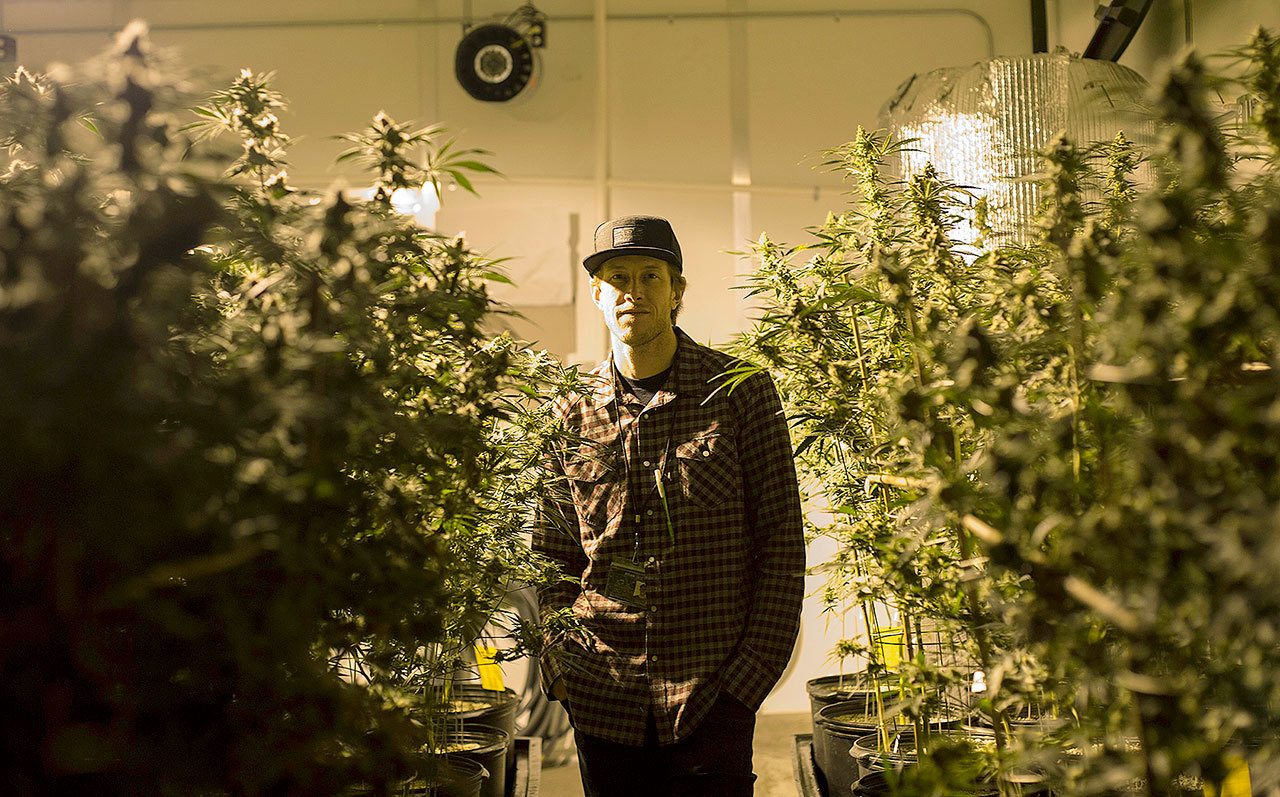By Jack Kaskey
Bloomberg News
The increasing supply of legal marijuana is turning into a major buzz kill for growers as prices plunge — and an opportunity for companies that can help cut production costs.
Prices are tumbling as formerly illicit cultivators emerge from the shadows to invest millions of dollars in massive pot factories. In Colorado, the average price sought by wholesalers has fallen 48 percent to about $1,300 a pound since legal sales to all adults started in January 2014, according to Cannabase, operator of the state’s largest market. Supply is surging as growers expand and install the latest agricultural technology.
“Anybody that is investing in this sector or starting a business in this sector needs to be doing so with the understanding that the price of cannabis is going to drop precipitously,” said Troy Dayton, chief executive officer of Oakland, California-based Arcview Group, a marijuana investor consortium. “The agricultural technology space is already booming, and now they get to lay their hands on the cannabis industry.”
The focus on efficiency can cut production costs for some indoor growers to less than $300 a pound from more than $1,000, said J. Chandler, vice president at Cultivation Technologies in Boulder, Colorado. His company sells machinery originally developed for tomato greenhouses, such as automated feeding and watering systems from Israel’s Netafim Ltd. and France’s Dosatron International.
“If you want to compete on a price game, you have to use versions of our technology to do it,” Chandler said. “Everybody is putting in irrigation systems, so that’s good for us.”
Cultivation Technologies also sells high-efficiency lights from Canada’s PL Light Systems, which compete with Gavita, a Dutch company purchased this year by Scotts Miracle-Gro Co. Scotts has been on a buying frenzy over the past two years, gobbling up leading companies that provide specialty fertilizers, lighting and other supplies for hydroponics, the indoor method of growing crops favored by U.S. cannabis cultivators.
Retail prices also are dropping, though not as fast as in the wholesale market. Marijuana shops in Colorado collected an average $6.61 per gram in November, down 25 percent from the first quarter of 2014, according to BDS Analytics, a research firm.
The regulated market in North America could triple to more than $20 billion in five years, from $6.7 billion last year, after California, Maine, Massachusetts and Nevada joined otherstates, including Washington, and legalized adult recreational pot use in November, according to Arcview.
One caveat surrounding the booming cannabis industry is President-elect Donald Trump’s choice for attorney general, Sen. Jeff Sessions of Alabama, an ardent marijuana foe. But it remains to be seen if Trump or the Republican-controlled Congress will attempt to challenge the states that have legalized the drug.
While more than half of U.S. states permit medical use, transporting cannabis across state lines remains a federal crime, making each state a market unto itself. That means growers in cloudy coastal Oregon or frigid Maine must use technology to create the warm, sunny conditions favored by pot plants, and they need to do it as efficiently as possible.
Decades of prohibition necessitated growing marijuana in clandestine basements, warehouses and garages, making growers comfortable with indoor production, said Leif Olsen, managing partner at Denver-based Good to Great Consulting. But with legalization comes an increasing need to compete on cost, and that will eventually shift the industry to efficient greenhouse production, he said.
“Growing inside is definitely an antiquated concept,” Olsen said. “It’s coming out of hiding.”
A hybrid greenhouse featuring insulated walls and a glass ceiling may consume less than half the energy of a warehouse, said Brandy Keen, vice president at Boulder-based Surna Inc. And a well designed climate-control system can cut energy needs while also providing pure water for plants with reclaimed condensate, she said.
The drive toward efficiency isn’t cheap. Brian Lade, owner of Smokey Point Productions in Arlington, Washington, started growing marijuana in a garage at age 17. He endured police raids and a few days in jail before the laws changed. Now he’s raised $25 million to expand his 15,000-square-foot warehouse operation to 135,000 square feet.
That’s enough space to pump out 1,700 pounds of buds monthly from dozens of custom-bred strains such as Dirty Girl and Cinderella’s Dream, up from 100 pounds. He also can process 2,200 pounds of purchased marijuana into cannabis oil and other concentrates for vaping.
While Lade increased production by 16 times, his employee count is up only four-fold, to 100, thanks to economies of scale and automation, he said. A machine mixes soil ingredients, pours the dirt into containers and then digs holes for young plants. A conveyor belt carries the container to an employee who does the delicate job of planting. Rather than relying on people to trim away leaves and stems from harvested pot, he’s trying out machines that automate the job.
“If you want to provide cannabis to your people, you’ve got to adapt or die,” said Lade, 40. “We are basically just going way bigger and then adding efficiencies like the machines and computer software.”
Energy-efficient Gavita lighting is installed in his old and new facilities. Computerized plumbing delivers custom-mixed nutrients to the plants. A climate-control system supplied by Surna not only maintains ideal pot-growing temperatures and humidity levels, but also helps eliminate mold problems, Lade said.
A hospital-clean environment with employees wearing uniforms washed on premises cuts down on plant pests.
“The cleaner you can be, the less chemicals you have to use,” Lade said.
Yet Lade knows he can do more to cut costs, specifically by building a hybrid greenhouse to capture light from the sun. That’s not a good option in perpetually overcast Washington, so he’s exploring the possibility of setting up shop in sunny Nevada or California, states where recreational use was approved in November.
Talk to us
> Give us your news tips.
> Send us a letter to the editor.
> More Herald contact information.

























